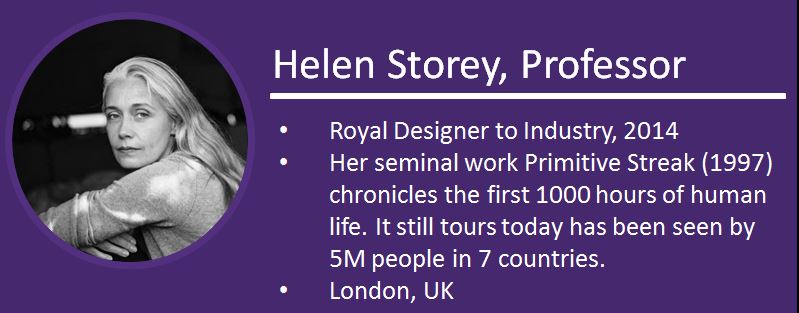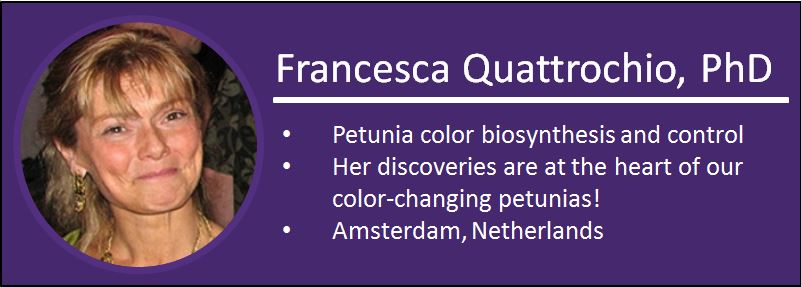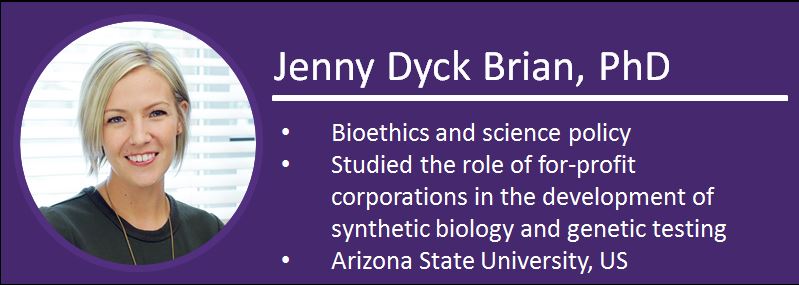The ladies moving Revolution Bio forward - International Women’s Day
As part of International Women’s Day, we wanted to introduce you to some of the incredible women working to bring together art and science in and creating a new space for conversation about biotechnology.
Each of these international women have brought a unique skill set that makes our color-changing flowers a truly vibrant, living work of art. The theme of International Women’s Day is #MakeItHappen - it takes all of us to effect change. We hope you’ll join us in supporting women working in science and art by contributing to our ongoing 
Professor Helen Storey’s work champions a cultural hybrid model of art which brings together fashion and science. In 1997, she launched her seminal work detailing the first 1000 hours of human life, Primitive Streak. To date, the installation has been seen by over 5 million people in 7 countries.
Since then, Prof. Storey and her science collaborators have created five other world renowned arts/science projects. Shewas made a Royal Designer to Industry in 2014 by the Royal Society of Arts and her curiosity with the beauty and possibilities of science continues to inspire her work. The Living Dress will incorporate Revolution Bioengineering’s color changing flowers and illustrate how we can harness nature to re-connect us back to the impact humans have on our natural world and how the two seemingly unconnected worlds of fashion and science can enlighten and come together.
Dr. Francesca Margherita Quattrocchio began her plant biology work in maize, moving to petunias to analyze the behavior of corn genetic elements when placed in a new context. In 1990, Quattrochio started her PhD project on regulatory genes controlling pigment biosynthesis in petunia petals. Soon after obtaining her PhD, her interests moved to the control of pH homeostasis in the vacuole: the cellular compartment where the pigments are stored. She revealed an entirely new mechanism by which plant cells hyper-acidify internal compartments and regulate ions traffic – Her discoveries are at the heart of our petunia flowers!
She studied Biology at the Sapienza University of Rome (Italy) and graduated in 1983. After a fellowship of the Italian National Research Council in Milan (Italy) to study the promoter structure and regulation of maize reserve protein genes, she obtained a short-term EMBO fellowship. Thereafter, she received a Marie Curie fellowship and joined the Genetics research group at VU University Amsterdam. This year she joins the University of Amsterdam.
Jenny Dyck Brian received her PhD in Biology and Society from Arizona State University. While at ASU, she worked in the Center for Biology and Society and the Consortium for Science, Policy and Outcomes. Her dissertation, which was supported by funding from the National Science Foundation and a PEO Scholars Award, investigated the role of bioethics committees within for-profit private sector bioscience companies. The project focuses on 3 case studies: the Ethics Advisory Board at Advanced Cell Technology, the Ethics and Public Policy Board at SmithKlineBeecham and the Bioethics Committee at Eli Lilly.
Prior to joining Barrett, The Honors College, she was an Assistant Professor of Bioethics at the Asian University for Women in Chittagong, Bangladesh, where she taught bioethics and science policy courses to students from 12 different countries. At the AUW, she also worked with 9 student research assistants on projects focusing on organ selling and trafficking in South Asia, and the role of for-profit corporations in the development of synthetic biology, genetic testing and geo-engineering.

Keira Havens grew up in Hawaii where she was fascinated by flowers, bugs, and the ocean. After receiving her Bachelor’s in Molecular Biophysics and Biochemistry from the Illinois Institute of Technology in 2004, she accepted a commission in the United States Air Force. She left active duty to pursue a degree in a synthetic biology laboratory and received her M.S. from Colorado State University in 2014.
As part of her academic work on detector plants she encountered an interesting paradox – the same people who disliked agricultural GMOs liked the idea of this applied biotechnology. It was biotechnology that they could see a benefit in, a biotechnology that amazed and delighted. Keira wanted to bring more wonder into the world through science, and so she founded Revolution Bioengineering with colleague Nikolai Braun. Their goal: to make biotechnology beautiful, starting with flowers that change color throughout the day.
Ladies, we are thrilled to be working with you & look forward to making some beautiful biotechnology. Let’s inspire the next generation of female scientists, artists, and thinkers!







